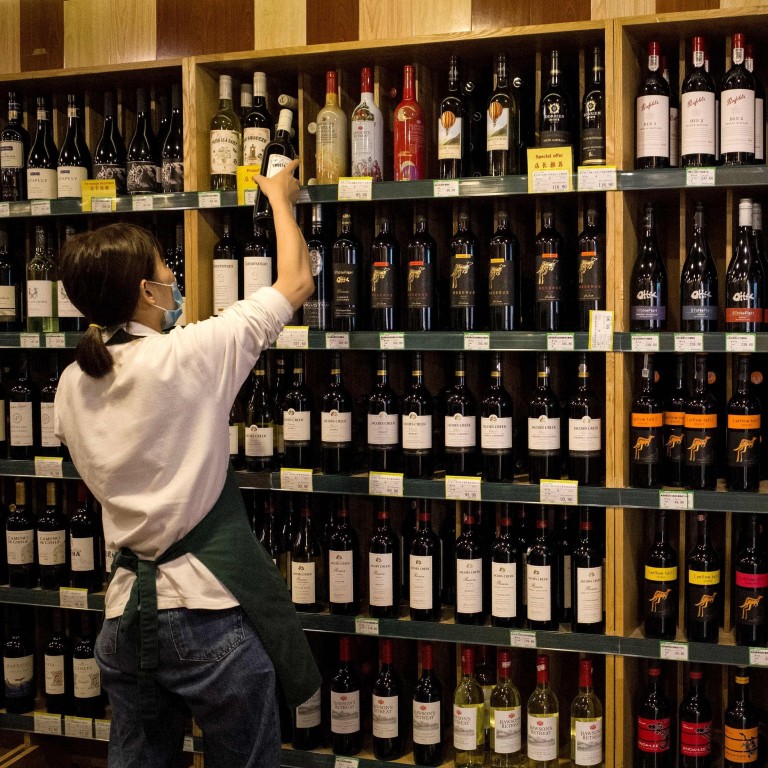
China-Australia relations: ‘speechless’ exporters fear Beijing may impose crippling anti-dumping duty on Australian wine
- Industry players in Australia await possible result from a months-long investigation into whether inexpensive wines have been ‘dumped’ in China
- News comes as Australia braces for an anticipated ban on exports to China that has already seen shipments of wine cancelled or suspended
China may impose an anti-dumping duty of more than 200 per cent on Australian wine as soon as next week – a move that would effectively kick Australian wine brands out of the Chinese market as exporters are still reeling from the news this week of a possible outright ban on wine and other Australian products.
The duty imposition, as flagged by industry group Australian Grape & Wine, could come on top of an anticipated ban on Australian exports that has already seen shipments of Australian wine cancelled or suspended this week.
Li Wei, CEO of Australian wine exporter and producer Swan Wine Group, based in Sydney, was crestfallen at the developments, saying all of his Chinese customers have stopped placing orders.
“We really didn’t think it would get to this stage,” he said. “We are very disappointed.
“I feel that the Australia-China relationship has reached a freezing point. We hope the Australian government can come up with some workable strategies to revive it.”
The investigation may come to a head next week, as investigation questionnaires from exporters are due on November 13. After reviewing the questionnaires, authorities will decide whether it is necessary to impose the steep duties.
The investigation is expected to take a year, but Chinese authorities may decide to impose provisional anti-dumping duties earlier. The earliest time to do that is 60 days after the start of the investigation, which was October 17, although they also need sufficient evidence.
“It’s possible that a duty can be imposed. We won’t expect any … but it is probable,” said Tony Battaglene, CEO of Australian Grape & Wine, which is representing Australian interests in the investigation.
On Wednesday, CADA agitated tensions further when it called for “retrospective tariffs” on Australian wine imports already shipped, according to a stock exchange filing by one of Australia’s biggest winemakers, Treasury Wine Estates – a named producer in the investigation – prompting Australian trade minister Simon Birmingham to reiterate on a local radio station that Australian exporters did not engage in dumping.
“What I would urge Chinese authorities to do is to make it very clear that the commitments they’ve given to Australia under the China Australia Free Trade Agreement … will be honoured,” he said.
Meanwhile, Battaglene said the wine industry was taking the possible ban seriously, even though Chinese authorities had not issued a formal notice. Across China and Australia, many wine traders told the Post they were nervous and frantic.
Australia is the largest exporter of wine to China, ahead of France and Chile. According to the data provided by CADA, China’s imports of Australian wine more than doubled to 120 million litres in 2019 from 56 million litres in 2015.
Local commerce departments in China have verbally instructed wine importers across the country to avoid importing Australian wine from Friday, saying the risk of being rejected was “high”, but there are fresh indications that goods already on their way could still be accepted if importers notify China customs authorities at relevant ports.
Any losses of shipments turned away would be borne by the traders.
“This is unprecedented,” said a South Australian wine exporter surnamed Michele, who declined to give her full name. She has been exporting to China for eight years and said that all of her orders have been suspended.
“After the anti-dumping announcement, we were too scared to move stock, but after October things seemed calm, and just as we were about to resume some shipments, this ban came along … we are all speechless,” she said. “We have never seen this before. All our hard work building this relationship is now wasted
“We are thinking of not exporting any more Australian wine [to China], because these threats are just too difficult to surmount.”
And other veteran industry players, such as Tom Cosgrove of Pioneer Wine Group, which has been developing premium wine exclusively for the Chinese market, said the ban could sink their investments.
For his part, Cosgrove remains hopeful but says he is holding out to see what happens on Friday.

